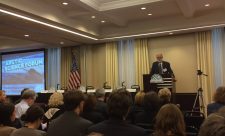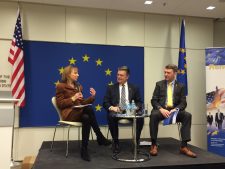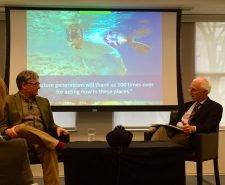The NOPP continuously strives to keep our web presence current, engaging, and easy to access. This month, we added a section for Daily Ocean News, where we bring together ocean related news from local and national media, academic journals and corporate/trade sources to keep you informed and up-to-date on trending issues. If you are interested in receiving news and program updates please sign up here.
This month, the NOPP welcomed to the team Dr. Barbara Bischof as the new Program Manager.
This month, the NOPP also attended several forums with a focus on international cooperation:
- The Consortium for Ocean Leadership’s 2015 Public Policy Forum – Predicting

and Preparing for a Changing Arctic, covered scientific research, shipping and security operations, and stakeholder perspectives on our changing Arctic ecosystem. As the US assumes chairmanship of the Arctic Council in April, speakers emphasized cooperation among the eight Arctic nations would be necessary to ensure sustainable use of our marine resources. Senators Lisa Murkowski (R-AK) and Angus King (I-ME) were guest speakers at the forum where they announced the formation of a Senate Arctic Caucus. The vision for the Caucus is to raise awareness about Arctic issues, including infrastructure and security, and act as a launch site for legislation.
- The Delegation of the European Union to the United States held a panel

discussion, The Atlantic Ocean Research Alliance: Progress, Potential and Its Wider Policy Contexts, where policy experts from the E.U. and the U.S. discussed shared objectives, including ocean observations, ocean literacy, and international coordination. The discussion was inspired by a joint agreement between the US, Canada and the EU, culminating in the Atlantic Ocean Research Alliance that began in May 2013 with the “Galaway Statement on Atlantic Ocean Cooperation.”
- The resounding take-away message from a discussion at the Wilson Center, Islands as Champions of Resistance, was that island-nations are pioneers in climate change resiliency. Panelists provided examples from Madagascar, Micronesia, Jamaica, and other island-nations where community-based stewardship programs and holistic population-health-environment strategies have proven effective in planning for climate change disasters and long-term sustainable development.
The NOPP also attended events addressing fisheries management, superstorms and protected areas:
- The American Fisheries Society hosted the first of three briefings, focused on federal fisheries management issues. Fisheries experts covered the basics of stock assessments, explained why all uncertainty is not created equal and addressed challenges in challenges related to climate change.
- In a briefing hosted by the National Science Foundation and the American Association for the Advancement of Science, attendees learned that hurricanes and tornadoes cause some of the greatest percentage loss to America’s economy, 40% and 37%, respectively. In addition, the impact of hurricanes on our economy and safety was shown to be escalating, especially with greater numbers of Americans moving towards the coast. The effects of solar storms were also discussed in contexts of increasing reliance on technologies that are affected by them, such as satellites, power-grids, and telecommunications systems.
- The Pew Charitable Trusts hosted an event titled “How we have changed life in

the world’s oceans and how we can change course,” which featured a presentation and Q&A session with University of York professor, Callum Roberts. Roberts’ talk focused on celebrating the establishment of the world’s largest marine reserve around the Pitcairn Islands established by the UK early this month.
To stay up-to-date on the NOPP, please follow us on Facebook and Twitter

